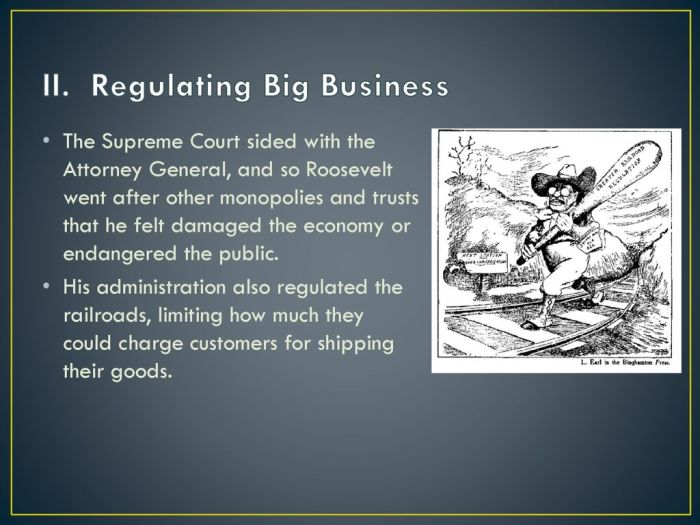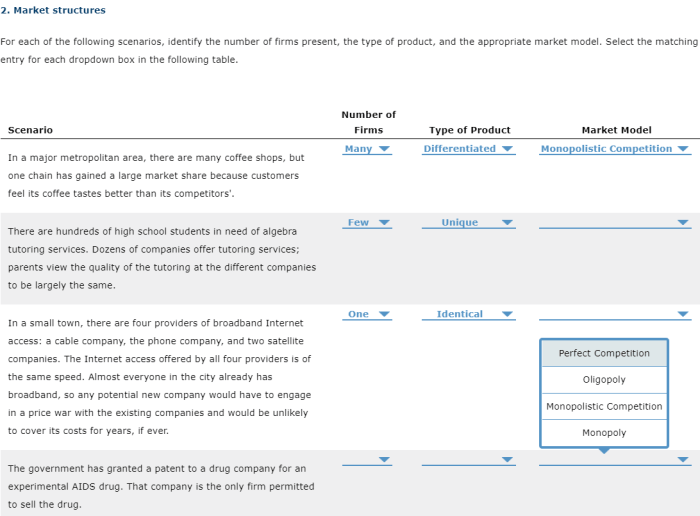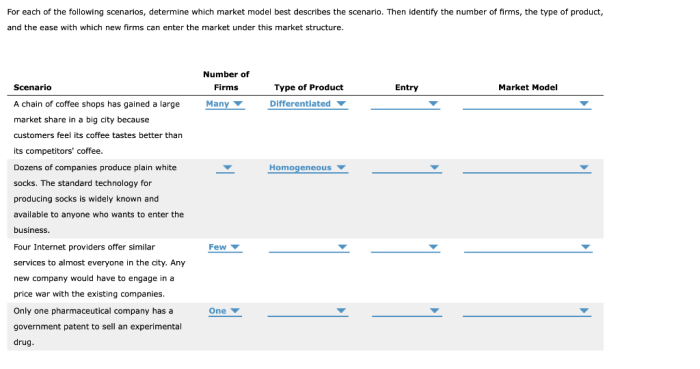In regard to regulating companies roosevelt wanted them to serve – President Franklin D. Roosevelt’s presidency marked a significant turning point in the regulation of corporations in the United States. Roosevelt believed that corporations should serve the public interest, and he took decisive action to ensure that they did. This essay will explore Roosevelt’s perspective on corporate regulation, the arguments for and against such regulation, and the various methods used to regulate corporations.
It will also discuss the contemporary challenges and opportunities in corporate regulation.
Roosevelt’s views on corporate regulation were shaped by the historical context of the early 20th century. The rapid growth of corporations and the concentration of economic power in the hands of a few large companies led to widespread concerns about the potential for corporate abuse.
Roosevelt believed that the government had a responsibility to protect the public from these abuses and to ensure that corporations served the public interest.
Roosevelt’s Perspective on Corporate Regulation

Theodore Roosevelt, the 26th President of the United States, held a firm belief that corporations should operate in the public interest. He argued that corporations had a responsibility to society beyond maximizing profits and that they should be subject to government regulation to ensure that they did not abuse their power.
Roosevelt’s views on corporate regulation were influenced by the historical context of the late 19th and early 20th centuries. During this period, the United States experienced rapid industrialization and the rise of large corporations. These corporations often engaged in anti-competitive practices, such as forming monopolies and price-fixing agreements, which stifled competition and harmed consumers.
In response to these concerns, Roosevelt advocated for stronger government regulation of corporations. He believed that the government had a responsibility to protect the public from the potential abuses of corporate power.
Roosevelt’s efforts to regulate corporations included:
- The Sherman Antitrust Act (1890): This law prohibited monopolies and other anti-competitive practices.
- The Hepburn Act (1906): This law regulated the railroad industry, giving the government the power to set rates and prevent discrimination.
- The Pure Food and Drug Act (1906): This law established standards for food and drug safety.
Arguments for and Against Corporate Regulation: In Regard To Regulating Companies Roosevelt Wanted Them To Serve

Arguments in Favor of Corporate Regulation
- Protects consumers from unsafe or harmful products and services.
- Promotes fair competition and prevents monopolies.
- Ensures that corporations operate in the public interest.
- Prevents corporations from engaging in anti-competitive practices, such as price-fixing and collusion.
Arguments Against Corporate Regulation
- Can stifle innovation and economic growth.
- Can create unnecessary burdens for businesses.
- Can be ineffective in preventing corporate misconduct.
- Can lead to government overreach and excessive control of the private sector.
Potential Benefits and Drawbacks of Corporate Regulation
The potential benefits of corporate regulation include:
- Increased consumer protection.
- Increased competition.
- Reduced corporate misconduct.
The potential drawbacks of corporate regulation include:
- Reduced innovation.
- Increased costs for businesses.
- Potential for government overreach.
Methods of Corporate Regulation
There are various methods used to regulate corporations, including:
Antitrust Laws
Antitrust laws prohibit anti-competitive practices, such as monopolies, cartels, and price-fixing. The Sherman Antitrust Act (1890) is the primary antitrust law in the United States.
Consumer Protection Laws
Consumer protection laws protect consumers from unsafe or harmful products and services. The Consumer Product Safety Act (1972) is a key consumer protection law in the United States.
Environmental Regulations
Environmental regulations protect the environment from pollution and other harmful activities. The Clean Air Act (1970) and the Clean Water Act (1972) are key environmental regulations in the United States.
Effectiveness of Different Regulatory Approaches
The effectiveness of different regulatory approaches depends on the specific context and the goals of the regulation.
Antitrust laws have been effective in preventing monopolies and promoting competition. Consumer protection laws have been effective in protecting consumers from unsafe products and services. Environmental regulations have been effective in reducing pollution and protecting the environment.
However, no regulatory approach is perfect. Antitrust laws can be difficult to enforce, and corporations can find ways to evade them. Consumer protection laws can be complex and burdensome for businesses. Environmental regulations can be costly for businesses and can lead to job losses.
Examples of Successful and Unsuccessful Attempts to Regulate Corporations
Some successful attempts to regulate corporations include:
- The Sherman Antitrust Act (1890): This law has been effective in preventing monopolies and promoting competition.
- The Pure Food and Drug Act (1906): This law has been effective in protecting consumers from unsafe food and drugs.
- The Environmental Protection Agency (EPA): This agency has been effective in reducing pollution and protecting the environment.
Some unsuccessful attempts to regulate corporations include:
- The Sarbanes-Oxley Act (2002): This law was intended to prevent corporate fraud, but it has been criticized for being too complex and burdensome for businesses.
- The Dodd-Frank Wall Street Reform and Consumer Protection Act (2010): This law was intended to prevent another financial crisis, but it has been criticized for being too complex and ineffective.
Contemporary Issues in Corporate Regulation

There are a number of key challenges and opportunities in regulating corporations in the modern era.
Role of Technology
Technology is rapidly changing the business landscape, and this is creating new challenges for regulators.
For example, the rise of the internet has made it easier for corporations to engage in anti-competitive practices, such as price-fixing and collusion.
Regulators are also struggling to keep up with the rapid pace of technological innovation.
Globalization
Globalization is another major challenge for regulators.
Corporations are increasingly operating across borders, and this makes it difficult to regulate them effectively.
For example, a corporation may be headquartered in one country, but its manufacturing facilities may be located in another country.
Social Responsibility
There is a growing movement to hold corporations accountable for their social and environmental impact.
This is leading to new demands for regulation, such as requiring corporations to report on their environmental and social performance.
Emerging Trends and Future Directions in Corporate Regulation, In regard to regulating companies roosevelt wanted them to serve
There are a number of emerging trends and future directions in corporate regulation.
- Increased use of technology to regulate corporations.
- Greater focus on international cooperation to regulate corporations.
- Increased emphasis on corporate social responsibility.
Essential Questionnaire
What was Roosevelt’s main argument for regulating corporations?
Roosevelt believed that corporations should serve the public interest, and he argued that government regulation was necessary to ensure that they did.
What were some of the specific policies that Roosevelt implemented to regulate corporations?
Roosevelt implemented a number of policies to regulate corporations, including antitrust laws, consumer protection laws, and environmental regulations.
What are some of the contemporary challenges and opportunities in corporate regulation?
Some of the contemporary challenges and opportunities in corporate regulation include the role of technology, globalization, and social responsibility.